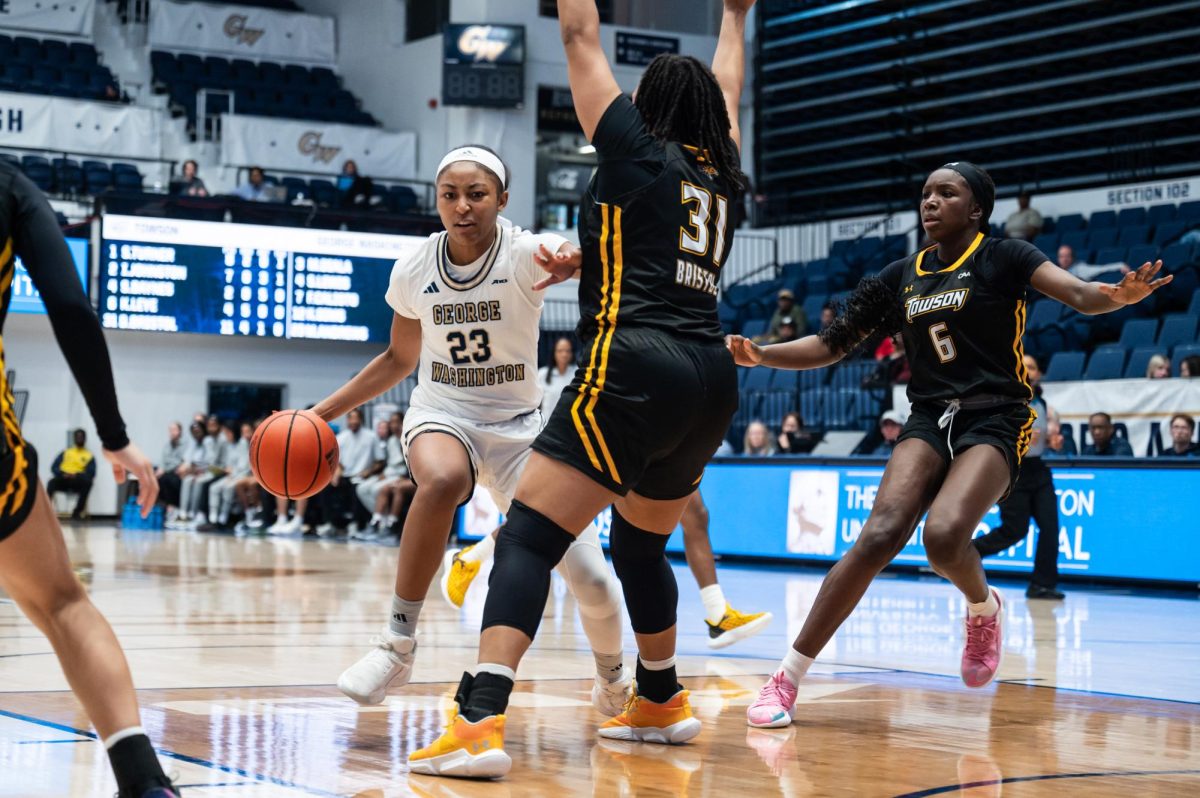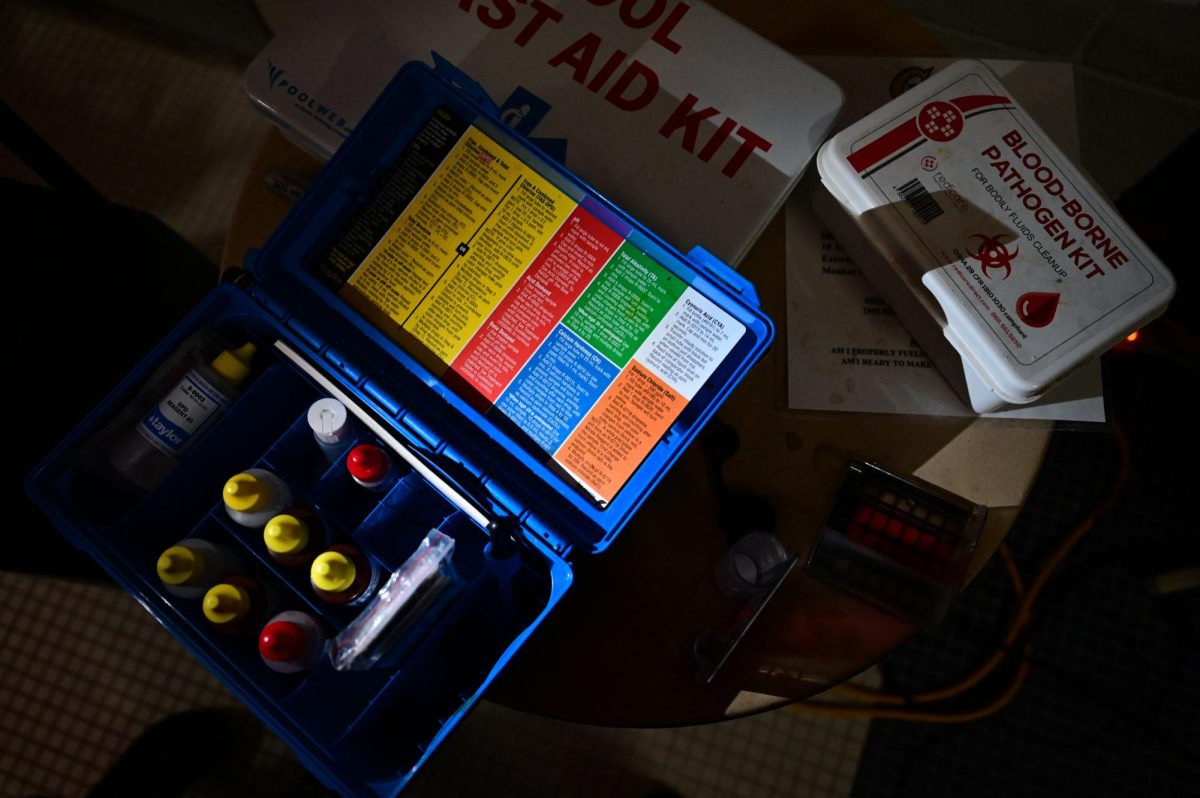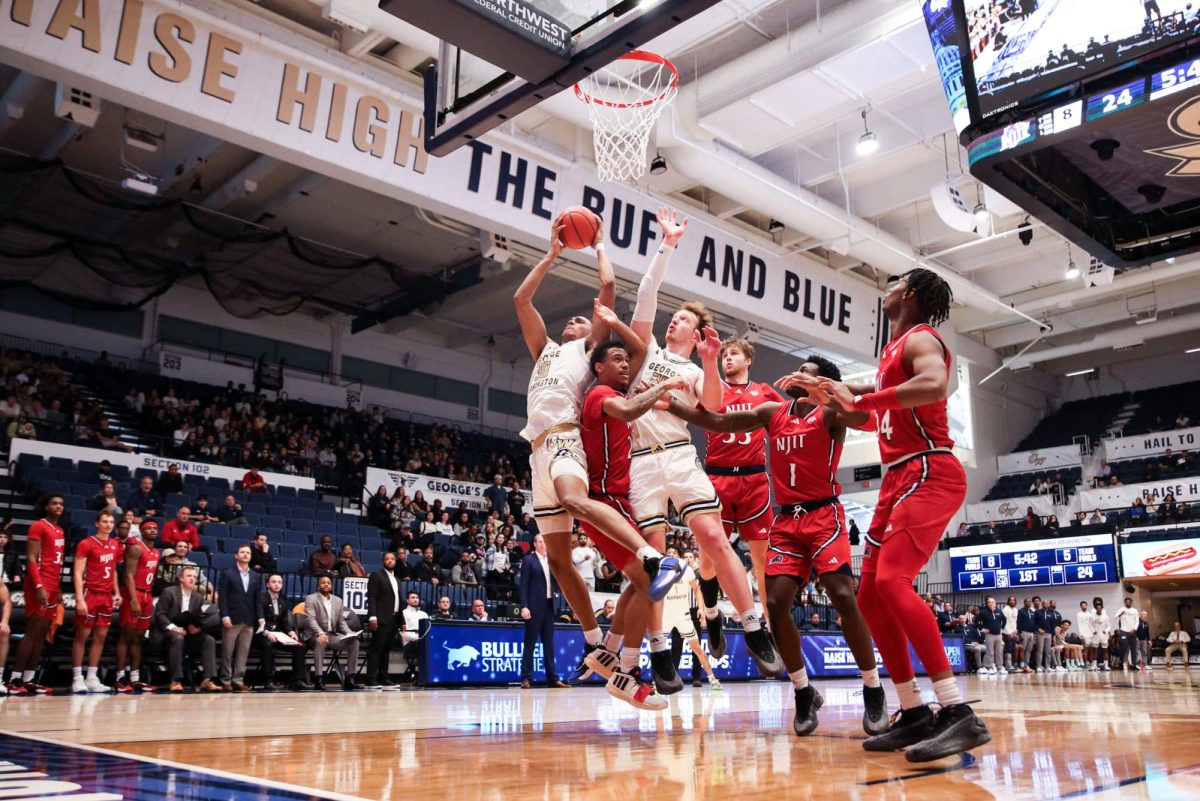Major League Baseball is born again in the diamond-shaped city. Reuniting wasn’t supposed to feel so cold.
To stay warm on this chilly Saturday night – and celebrate Vinny Castilla’s fourth inning two-run homer – the RFK Stadium crowd of nearly 35,000 jumps up and down in unison, violently shaking the faded maroon, yellow and orange painted seats. Imagine the quakes the rickety place felt during Redskins games over the years.
Fans may never embrace the new Washington Nationals like their ‘Skins, but baseball returned to the District for the first time in 34 years last weekend with a three-game series against the Arizona Diamondbacks.
Saturday night’s crowd lacked the star power of Thursday’s home opener. President Bush failed to brave the cold, and most senators and congressmen chose the television broadcast over the upper deck.
But even when the place does not fill up, those in attendance make their presence felt.
“When you get something going boy,” team manager Frank Robinson said, “they let you know they’re there.”
Nats closer Chad Cordero, who got a bit of work in the ninth inning of a 9-3 win Saturday, noticed the stands shaking after every Washington run to cross the plate.
“The fans have been helping a lot,” said Cordero, who like most Nationals players has heard his share of questions about newfound fan support. “We don’t have to split home games in Puerto Rico this year, so yeah, it will help us.”
Students usually engrossed in politics or the Yankees-Red Sox rivalry are already among those who follow the local National League nine. On campus, red and navy caps with white script “W’s” may soon outnumber those adorned with “B’s” and “NY’s”. Some in the GW community are just fans, but a few go further than that.
*
On a field full of Nats playing long toss and taking batting practice cuts, the team’s batboy – GW junior Jonathan Kolker – looks like a gnat.
“You can’t be a batboy. You have to be a bat man. You have to be developed,” Kolker says. Dressed in a full red and white uniform, chewing day-glow yellow bubble gum, Kolker leans back on the dugout bench. He is a mini-Nat, a Natty Light.
He’s a batboy, but he sure talks like a major leaguer. His thoughts on the steroid issue?
“Next question,” he says with a wry smile. He also understands the clubhouse code. “It’s the clubhouse. What goes on in the clubhouse stays in the clubhouse.”
After a couple years on the job, he’ll admit it: he has the persona down pat: “the interview voice” as he calls it. The Pikesville, Md. native worked as the visiting team’s batboy for the Baltimore Orioles before getting the Nationals job, and remembers his days as a green rookie.
“My first day, a guy I worked with asked me to ask (then Orioles pitcher) Scott Erickson where the keys to the batter’s box were,” Kolker says. “I fell for the oldest one in the book. I figured you know, it’s my first day, maybe he means the batting cage.”
Wrong – there are no keys to the batter’s box. Erickson cracked up, and Kolker’s job officially began. Despite past rookie mistakes, the GW student has not committed the batboy’s cardinal sin: interfering in a live play.
“I haven’t messed up really,” Kolker said. “The slight thing I did do was my first game working with Oakland. After you break a bat, you have to get a new bat before you get the old bat. So David Justice broke a bat and I ran out to get it and he was like, ‘Where’s my bat?'”
Just two games into the new gig, he already loves the Nats. Long hours and laundry duty don’t bother him. What’s the hardest part of the job?
“Leaving the stadium after games,” he says.
When batting practice ends, Kolker jets back into the clubhouse to grab boxes of sunflower seeds for the dugout. Even during such a busy couple of days, he marvels at the Nats’ initial success – the team is off to a 8-4 start after sweeping the Diamondbacks last weekend.
“The first game was a blur,” Kolker says. “But there’s a buzz here. There’s a buzz in the streets. You can feel it.”
*
“You look like you know where you’re going,” usher Harold Solomon tells a woman holding a glossy gold-lettered ticket. She nods, and heads to her box seat situated a few rows from the field.
“When I went to school here,” says Solomon, a 1989 GW graduate. “Baseball was the furthest thing from my mind.”
He played on the GW basketball team just before the program hit its early ’90s stride. A role player, he played two-guard, “maybe six or eight minutes a game,” he says.
“I wasn’t a straight bench warmer,” he says with a belly laugh.
Now, 16 years after he graduated from GW, he will man RFK’s section 119 during 81 Nationals home games. As Solomon likes to say, he “wears many hats.” He teaches golf in suburban Maryland, he works Redskins games at Fed Ex Field, he runs “Hoops for the Homeless,” a charity event at the MCI Center that raised nearly $500,000 for D.C. area shelters in 2004. And, he’s a father of two.
He has seen lots of sports in this city, but baseball brings energy like Solomon has never seen. He hopes it will also bring greater community involvement to the city. He cites Mayor Anthony Williams’ promise to give out 1,000 tickets per game to D.C. children when a new stadium is built.
Game time draws near, and Solomon gets back to work. Still, Thursday’s home opener remains fresh in his brain.
“The atmosphere was explosive,” he says. “It was like a father being in a living room with his wife having their first child. It was powerful, spiritual even.”
*
Lars Thorn came into the world at the GW hospital nearly 30 years ago. He lacked a home team growing up in Northwest D.C. Shortly after earning his graduate degree in sports management at GW in 2004, he got a team – and a job.
“It’s what I’ve dreamt of,” says Thorn, the Nationals’ manager of media relations. After the Nats fourth straight win, he stands in manager Frank Robinson’s spot on the top step of the dugout, with one foot on the red dirt that circles the diamond.
Looking at the field, the stands and the live sprinklers, he sounds like a kid recalling his first baseball game.
“To stand right here, watching the president throw out the first pitch the other night,” Thorn says. “It was one of the most incredible experiences of my entire life.”
Nostalgia aside, Thorn only wishes he had spectator status. For the past few months, he has dedicated his entire being to Washington’s new team. The national media came out in record numbers on opening night. He must accommodate press, set up interviews, and shuttle players to live television shots.
“The challenge is that because you’re dealing with so many people, there’s only so much you can give,” he says. “When there’s 600 media members and 100 of them want one-on-one interviews with Frank Robinson, you can only do so much.”
The intensity and the hours of the job (he will travel to half the away games) might wear on someone else, but not Thorn. Baseball’s back in D.C. and he can only smile.
“I’ve always loved sports, I’ve loved the game on the field, and the community it facilitates,” he says. “This is one of the biggest moments in sports in Washington history.”






